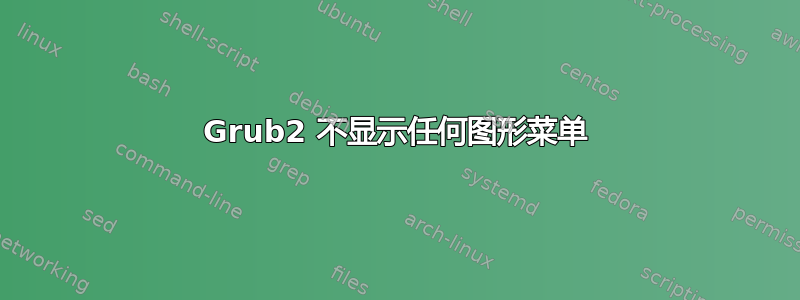
我最近在我的系统上安装了 Ubuntu,由于我之前的 grub2 安装很混乱,所以我决定在这个 ubuntu 分区上重新安装 grub2。
无论如何,它并没有完全发挥作用:grub-install 没有给出任何错误,但是在重新启动时,grub 不会显示其菜单,而只会显示其命令行。
我可以从那里启动我电脑上的所有操作系统,但这是我长期想要避免的事情(使用美国键盘映射输入 4 行代码比滚动到特定条目稍慢)。
我尝试了 GRUB_TERMINAL 的各种设置,但没有得到任何变化。在命令行提示符之前我看不到任何错误消息,只有 grub 命令介绍消息。
这是我的/boot/grub/grub.cfg:
#
# DO NOT EDIT THIS FILE
#
# It is automatically generated by grub-mkconfig using templates
# from /etc/grub.d and settings from /etc/default/grub
#
### BEGIN /etc/grub.d/00_header ###
if [ -s $prefix/grubenv ]; then
set have_grubenv=true
load_env
fi
set default="Debian GNU/Linux, with Linux 3.0.1-3.fc14.i686 (on /dev/sda5)"
if [ "${prev_saved_entry}" ]; then
set saved_entry="${prev_saved_entry}"
save_env saved_entry
set prev_saved_entry=
save_env prev_saved_entry
set boot_once=true
fi
function savedefault {
if [ -z "${boot_once}" ]; then
saved_entry="${chosen}"
save_env saved_entry
fi
}
function recordfail {
set recordfail=1
if [ -n "${have_grubenv}" ]; then if [ -z "${boot_once}" ]; then save_env recordfail; fi; fi
}
function load_video {
insmod vbe
insmod vga
insmod video_bochs
insmod video_cirrus
}
insmod part_msdos
insmod ext2
set root='(hd0,msdos7)'
search --no-floppy --fs-uuid --set=root b34ab83e-0c3a-4671-bcd5-786b37622389
if loadfont /usr/share/grub/unicode.pf2 ; then
set gfxmode=800x600x24
load_video
insmod gfxterm
insmod part_msdos
insmod ext2
set root='(hd0,msdos7)'
search --no-floppy --fs-uuid --set=root b34ab83e-0c3a-4671-bcd5-786b37622389
set locale_dir=($root)/boot/grub/locale
set lang=fr_FR
insmod gettext
fi
terminal_input console
terminal_output gfxterm
if [ "${recordfail}" = 1 ]; then
set timeout=-1
else
set timeout=10
fi
### END /etc/grub.d/00_header ###
### BEGIN /etc/grub.d/05_debian_theme ###
set menu_color_normal=white/black
set menu_color_highlight=black/light-gray
if background_color 44,0,30; then
clear
fi
### END /etc/grub.d/05_debian_theme ###
### BEGIN /etc/grub.d/10_linux ###
function gfxmode {
set gfxpayload="$1"
if [ "$1" = "keep" ]; then
set vt_handoff=vt.handoff=7
else
set vt_handoff=
fi
}
if [ ${recordfail} != 1 ]; then
if [ -e ${prefix}/gfxblacklist.txt ]; then
if hwmatch ${prefix}/gfxblacklist.txt 3; then
if [ ${match} = 0 ]; then
set linux_gfx_mode=keep
else
set linux_gfx_mode=text
fi
else
set linux_gfx_mode=text
fi
else
set linux_gfx_mode=keep
fi
else
set linux_gfx_mode=text
fi
export linux_gfx_mode
if [ "$linux_gfx_mode" != "text" ]; then load_video; fi
menuentry 'Ubuntu, avec Linux 3.2.0-24-generic-pae' --class ubuntu --class gnu-linux --class gnu --class os {
recordfail
gfxmode $linux_gfx_mode
insmod gzio
insmod part_msdos
insmod ext2
set root='(hd0,msdos7)'
search --no-floppy --fs-uuid --set=root b34ab83e-0c3a-4671-bcd5-786b37622389
linux /boot/vmlinuz-3.2.0-24-generic-pae root=UUID=b34ab83e-0c3a-4671-bcd5-786b37622389 ro quiet splash $vt_handoff
initrd /boot/initrd.img-3.2.0-24-generic-pae
}
menuentry 'Ubuntu, avec Linux 3.2.0-24-generic-pae (mode de dépannage)' --class ubuntu --class gnu-linux --class gnu --class os {
recordfail
insmod gzio
insmod part_msdos
insmod ext2
set root='(hd0,msdos7)'
search --no-floppy --fs-uuid --set=root b34ab83e-0c3a-4671-bcd5-786b37622389
echo 'Chargement de Linux 3.2.0-24-generic-pae ...'
linux /boot/vmlinuz-3.2.0-24-generic-pae root=UUID=b34ab83e-0c3a-4671-bcd5-786b37622389 ro recovery nomodeset
echo 'Chargement du disque mémoire initial ...'
initrd /boot/initrd.img-3.2.0-24-generic-pae
}
submenu "Previous Linux versions" {
menuentry 'Ubuntu, avec Linux 3.2.0-23-generic-pae' --class ubuntu --class gnu-linux --class gnu --class os {
recordfail
gfxmode $linux_gfx_mode
insmod gzio
insmod part_msdos
insmod ext2
set root='(hd0,msdos7)'
search --no-floppy --fs-uuid --set=root b34ab83e-0c3a-4671-bcd5-786b37622389
linux /boot/vmlinuz-3.2.0-23-generic-pae root=UUID=b34ab83e-0c3a-4671-bcd5-786b37622389 ro quiet splash $vt_handoff
initrd /boot/initrd.img-3.2.0-23-generic-pae
}
menuentry 'Ubuntu, avec Linux 3.2.0-23-generic-pae (mode de dépannage)' --class ubuntu --class gnu-linux --class gnu --class os {
recordfail
insmod gzio
insmod part_msdos
insmod ext2
set root='(hd0,msdos7)'
search --no-floppy --fs-uuid --set=root b34ab83e-0c3a-4671-bcd5-786b37622389
echo 'Chargement de Linux 3.2.0-23-generic-pae ...'
linux /boot/vmlinuz-3.2.0-23-generic-pae root=UUID=b34ab83e-0c3a-4671-bcd5-786b37622389 ro recovery nomodeset
echo 'Chargement du disque mémoire initial ...'
initrd /boot/initrd.img-3.2.0-23-generic-pae
}
}
### END /etc/grub.d/10_linux ###
### BEGIN /etc/grub.d/20_linux_xen ###
### END /etc/grub.d/20_linux_xen ###
### BEGIN /etc/grub.d/20_memtest86+ ###
menuentry "Memory test (memtest86+)" {
insmod part_msdos
insmod ext2
set root='(hd0,msdos7)'
search --no-floppy --fs-uuid --set=root b34ab83e-0c3a-4671-bcd5-786b37622389
linux16 /boot/memtest86+.bin
}
menuentry "Memory test (memtest86+, serial console 115200)" {
insmod part_msdos
insmod ext2
set root='(hd0,msdos7)'
search --no-floppy --fs-uuid --set=root b34ab83e-0c3a-4671-bcd5-786b37622389
linux16 /boot/memtest86+.bin console=ttyS0,115200n8
}
### END /etc/grub.d/20_memtest86+ ###
### BEGIN /etc/grub.d/30_os-prober ###
menuentry "Windows 7 (loader) (on /dev/sda1)" --class windows --class os {
insmod part_msdos
insmod ntfs
set root='(hd0,msdos1)'
search --no-floppy --fs-uuid --set=root 9CDC9835DC980C20
chainloader +1
}
menuentry "Windows Recovery Environment (loader) (on /dev/sda2)" --class windows --class os {
insmod part_msdos
insmod fat
set root='(hd0,msdos2)'
search --no-floppy --fs-uuid --set=root 8299-11DD
drivemap -s (hd0) ${root}
chainloader +1
}
menuentry "Debian GNU/Linux, with Linux 3.0.1-3.fc14.i686 (on /dev/sda5)" --class gnu-linux --class gnu --class os {
insmod part_msdos
insmod ext2
set root='(hd0,msdos5)'
search --no-floppy --fs-uuid --set=root 3065baea-4365-4203-876f-6cf898dcd3a6
linux /boot/vmlinuz-3.0.1-3.fc14.i686 root=/dev/sda5 ro quiet
}
menuentry "Debian GNU/Linux, with Linux 3.0.1-3.fc14.i686 (recovery mode) (on /dev/sda5)" --class gnu-linux --class gnu --class os {
insmod part_msdos
insmod ext2
set root='(hd0,msdos5)'
search --no-floppy --fs-uuid --set=root 3065baea-4365-4203-876f-6cf898dcd3a6
linux /boot/vmlinuz-3.0.1-3.fc14.i686 root=/dev/sda5 ro single
}
### END /etc/grub.d/30_os-prober ###
### BEGIN /etc/grub.d/40_custom ###
# This file provides an easy way to add custom menu entries. Simply type the
# menu entries you want to add after this comment. Be careful not to change
# the 'exec tail' line above.
### END /etc/grub.d/40_custom ###
### BEGIN /etc/grub.d/41_custom ###
if [ -f $prefix/custom.cfg ]; then
source $prefix/custom.cfg;
fi
### END /etc/grub.d/41_custom ###
这是我的/etc/default/grub:
# If you change this file, run 'update-grub' afterwards to update
# /boot/grub/grub.cfg.
# For full documentation of the options in this file, see:
# info -f grub -n 'Simple configuration'
GRUB_DEFAULT="Debian GNU/Linux, with Linux 3.0.1-3.fc14.i686 (on /dev/sda5)"
#GRUB_HIDDEN_TIMEOUT="0"
GRUB_HIDDEN_TIMEOUT_QUIET="true"
GRUB_TIMEOUT="10"
GRUB_DISTRIBUTOR="`lsb_release -i -s 2> /dev/null || echo Debian`"
GRUB_CMDLINE_LINUX_DEFAULT="quiet splash"
GRUB_CMDLINE_LINUX=""
# Uncomment to enable BadRAM filtering, modify to suit your needs
# This works with Linux (no patch required) and with any kernel that obtains
# the memory map information from GRUB (GNU Mach, kernel of FreeBSD ...)
#GRUB_BADRAM="0x01234567,0xfefefefe,0x89abcdef,0xefefefef"
# Uncomment to disable graphical terminal (grub-pc only)
#GRUB_TERMINAL="console"
GRUB_TERMINAL_INPUT="console"
GRUB_TERMINAL_OUTPUT="gfxterm"
# The resolution used on graphical terminal
# note that you can use only modes which your graphic card supports via VBE
# you can see them in real GRUB with the command `vbeinfo'
GRUB_GFXMODE="800x600x24"
# Uncomment if you don't want GRUB to pass "root=UUID=xxx" parameter to Linux
#GRUB_DISABLE_LINUX_UUID="true"
# Uncomment to disable generation of recovery mode menu entries
#GRUB_DISABLE_RECOVERY="true"
# Uncomment to get a beep at grub start
#GRUB_INIT_TUNE="480 440 1"
我是否遗漏了配置过程的某个部分?Grub 过去一直是开箱即用的,至少在 ubuntu 中安装时是如此,因此这种情况极有可能出现。
提前致谢,
编辑:使用 aptitude 重新下载并重新安装 grub 现在可以解决问题。但我仍然想知道是什么导致了这个问题。
答案1
grub2通过查看生成的 来调试问题非常困难grub.cfg。遇到此类问题时,首先要尝试的grub2是清除其软件包并重新安装它们。使用其“简单”配置,grub2可能会运行良好。
但是,为了有效地调试grub2问题,建议在以下范围内运行它qemu:
sync ; echo 3 > /proc/sys/vm/drop_caches ; qemu -hda /dev/sdx
这使得调试过程更快(无需重新启动)并且同时减慢速度grub2以允许查看错误消息,否则在启动时读取速度太快。


